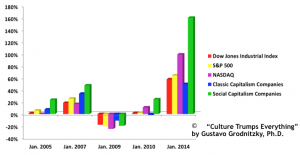With the government’s fiscal year ending at the end of September, we are getting to the time of year where organizations are getting really nervous about their budgets. They are starting to take a look at the money coming in, and asking themselves the simple question of “How am I EVER going to accomplish my goals for the next FY with what I’ve been given?” It goes back to what I said about money an earlier article, “[s]omehow, the government both prints the stuff, yet simultaneously doesn’t have enough of it.” No doubt, there are difficult decisions to be made in the weeks and months ahead, but, when it comes to the difficult decisions, make sure you aren’t doing more harm than necessary.
There is an excellent book written by Gustavo Grodnitzky called Culture Trumps Everything, and in his book he talks to the culture of your organization being its most prized asset. He goes on to group organizations into 2 buckets, one he refers to as Classic Capitalism and one he calls Social Capitalism. The Classic Capitalists make ever decision based on the bottom dollar, so, sure, you can use their conference room for your meeting, but you better bring your own coffee and bagels. The Social Capitalists focus on their stakeholders, and care more about doing right by them, then they do squeezing every penny out of their operations.
Dr. Grodnitzky goes on to coin the term the “Profit Paradox” and claims that companies that focus solely on profit, actually make less of it as seen in the graphic below. The Classic Capitalism companies were identified by Jim Collins in his 2001 book Good to Great, and the Social Capitalism companies were identified by Raj Sisodia in his 2007 book Firms of Endearment.
The graph above clearly states that the stock prices of Social Capitalism companies outperformed the Classic Capitalism companies from January 2010-2014, but the rationale may not be evident. Think back to 2008, and the economy was just beginning its decent into the Great Recession. At which point, the Classic Capitalism companies, went into slash and burn mode where they took all measures available to reduce their expenses from reducing staff to taking pastries out of the breakfast nook. Which was a financially prudent strategy…for the short term thinkers out there.
But, a year and a half later, when the economy began to turn back around, those companies weren’t positioned to take advantage of it. The morale of their employees were shaken to such a degree that they had changed their way of thinking from “we” to “me.” When you scream from the mountain tops “there’s no money!” – realize that there is going to be unintended consequences…
Switching back to the public sector, from what I’m hearing as I try to negotiate contracts for the next FY, the government is basically in their “recession” period. Money is tight across the board, as evident by the now 37 hoops to jump through before a dime can be spent. Someone double check me, but I’m pretty sure there only use to be 12 hoops…
Anyway, I’m imploring the decision makers out there, take this time to think strategically. Think about your mission, think about the assets that are essential to achieving that mission, and think through all of the potential short and long term consequences before making cuts. Culture is a fickle thing…it takes years to build, but hours to destroy. A dollar saved is only a dollar saved, if you can get that money back in the future.
It is easy to manage, budget, and lead when times are good. But, now is the time when the good leaders can separate themselves from the pack. Take advantage of the downturn by positioning your teams for long term success, and be wary of any changes that will have a negative impact on your culture.
If you are interested in learning more about the Profit Paradox in Dr. Grodnitzky’s own words, grab his book above or visit his blog post here.
Steve Palmer is part of the GovLoop Featured Blogger program, where we feature blog posts by government voices from all across the country (and world!). To see more Featured Blogger posts, click here.






Thanks for the post Steve! I’m definitely intrigued now to learn more about the Profit Paradox.
Francesca, I’ve read the book and heard the guy brief the material – I don’t think you’ll be disappointed. After you’ve read it, lets chat. It’s a topic that I’m very passionate about…